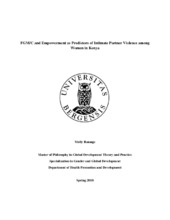| dc.description.abstract | The objective of this study is to determine if female genital mutilation and cutting (FGM/C) is associated with intimate partner violence (IPV) (of all subtypes: emotional, physical and sexual). This study used secondary data from the Kenyan Demographic Health Survey (KDHS) of 2014. A total of 5,672 participants who responded to both the domestic violence questionnaire within the 2014 KDHS (women and girls aged 15-49) were included in this study. A binary logistic regression was used to measure variance of IPV status among the study sample. The outcome of interest was IPV, with FGM/C women at slightly higher odds of IPV recording an odds ratio of 1.27. Of the socio-demographic predictors, having the highest education level were found protective against IPV, reducing IPV odds by .54, compared to wealth which was not significant in the final model. Women who made decisions about their own health care and household purchases dully with her husband/partners were .66 and .79 times (respectfully) less likely to experience IPV than those who do not. Empowerment variables were the most protective against IPV, and therefore programs that are already linked to the elimination of FGM/C could dually target IPV in the effort to improve women’s health and status across Kenya. | en_US |
